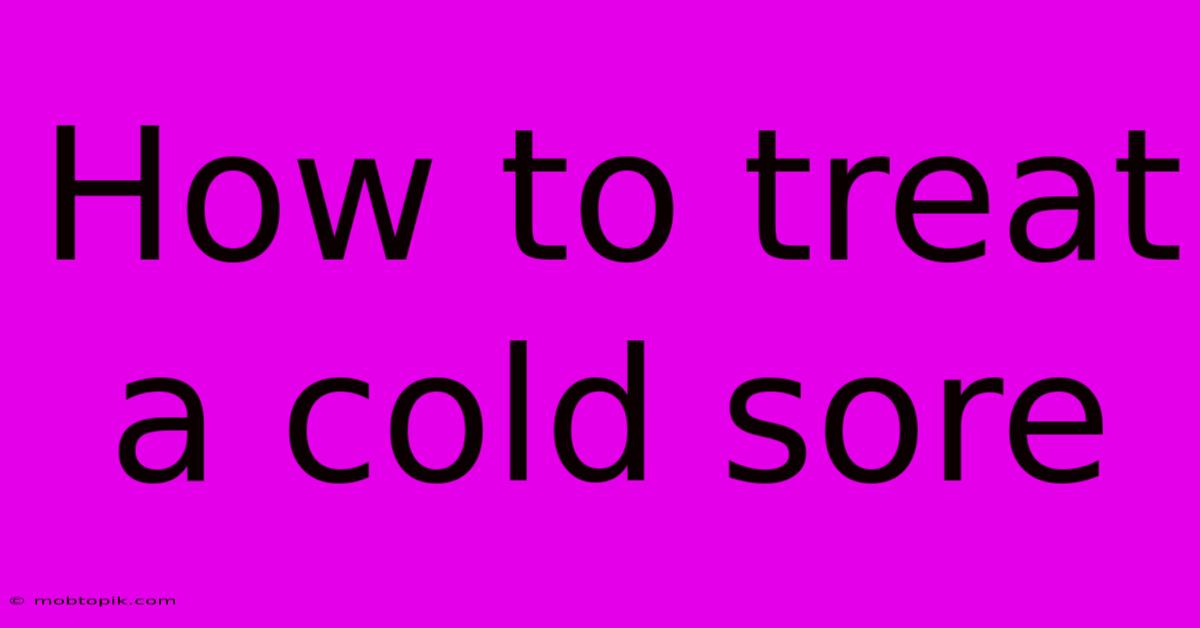How To Treat A Cold Sore

Discover more detailed and exciting information on our website. Click the link below to start your adventure: Visit Best Website mobtopik.com. Don't miss out!
Table of Contents
How to Treat a Cold Sore: A Comprehensive Guide
Cold sores, also known as fever blisters or oral herpes, are a common and often frustrating viral infection. Characterized by painful blisters on or around the lips, they're caused by the herpes simplex virus (HSV). While there's no cure for HSV, effective treatments can significantly reduce the duration and severity of outbreaks. This comprehensive guide explores various ways to treat a cold sore, from over-the-counter remedies to prescription medications and preventative measures.
Understanding Cold Sores: The Life Cycle of an Outburst
Before diving into treatments, understanding the stages of a cold sore outbreak is crucial for effective management. The typical cold sore lifecycle includes:
- Prodrome: This initial stage is characterized by tingling, itching, or burning sensations around the lips. This is often the best time to intervene and potentially prevent a full-blown outbreak.
- Vesicle Formation: Small, fluid-filled blisters appear. These blisters are highly contagious.
- Ulceration: The blisters break open, forming painful sores.
- Crusting: The sores begin to crust over and scab.
- Healing: The crust eventually falls off, leaving behind healthy skin.
Knowing these stages allows you to tailor your treatment approach to the specific phase of your outbreak.
Home Remedies for Cold Sore Relief
Many effective home remedies can ease the discomfort of cold sores and speed up healing. However, remember that these are palliative treatments—they alleviate symptoms but don't cure the virus.
1. Ice Packs: Reducing Swelling and Pain
Applying an ice pack wrapped in a thin cloth to the affected area for 10-15 minutes at a time can reduce swelling and numb the pain, especially in the early stages (prodrome and vesicle formation). Repeat this several times a day as needed.
2. Over-the-Counter Creams: Topical Relief
Several over-the-counter creams and ointments provide temporary relief. These often contain ingredients like:
- Docosanol (Abreva): This antiviral cream can shorten the duration of a cold sore outbreak.
- Benzocaine or lidocaine: These topical anesthetics numb the area, reducing pain.
Important Note: Always follow the product instructions carefully.
3. Warm Compresses: For Crusting and Healing Stages
Once the blisters have broken and crusted, warm compresses can help to soften the scabs and promote healing. Gently apply a warm, damp cloth to the affected area several times a day.
4. Lip Balm with SPF: Protecting the Healing Area
As the cold sore heals, it's crucial to protect the delicate skin from sun exposure. Use a lip balm with a high SPF (at least 30) to prevent further irritation and scarring.
Prescription Medications for Cold Sore Treatment
For more severe or frequent cold sores, your doctor may prescribe medication.
1. Antiviral Medications: Shortening the Duration
Prescription antiviral medications, such as acyclovir, valacyclovir, or famciclovir, can significantly reduce the duration and severity of outbreaks. These medications are most effective when taken at the first sign of an outbreak (prodrome stage).
2. Pain Relief Medication: Managing Discomfort
Your doctor may also prescribe pain relievers, such as ibuprofen or acetaminophen, to manage pain and discomfort associated with cold sores.
Preventing Cold Sore Outbreaks
While you can't completely prevent cold sores if you have the HSV virus, you can take steps to minimize outbreaks:
- Stress Management: Stress can trigger cold sores. Practice stress-reducing techniques like yoga, meditation, or deep breathing exercises.
- Healthy Lifestyle: Maintain a healthy immune system through a balanced diet, regular exercise, and sufficient sleep.
- Sun Protection: Protect your lips from the sun with lip balm containing SPF.
- Avoid Touching: Avoid touching your cold sores or the area around them to prevent spreading the virus to other parts of your body or to others.
- Hygiene: Wash your hands frequently to prevent the spread of the virus.
- Avoid Sharing: Don't share personal items like lip balm, razors, or towels with others.
When to See a Doctor
Consult your doctor if:
- You experience frequent or severe cold sore outbreaks.
- Your cold sore is unusually large or painful.
- Your cold sore doesn't heal within two weeks.
- You have concerns about your cold sore or its treatment.
Conclusion: Managing Cold Sores Effectively
Cold sores are a common ailment, but with the right treatment and preventative measures, you can manage them effectively and minimize their impact on your life. Remember that while home remedies can offer relief, prescription medications may be necessary for severe or recurrent outbreaks. Consult your doctor for personalized advice and treatment options. By understanding the life cycle of a cold sore and adopting proactive strategies, you can significantly reduce the frequency and severity of future occurrences, improving your overall comfort and well-being. Prioritizing a healthy lifestyle and practicing good hygiene are essential for long-term management of this common viral infection.

Thank you for visiting our website wich cover about How To Treat A Cold Sore. We hope the information provided has been useful to you. Feel free to contact us if you have any questions or need further assistance. See you next time and dont miss to bookmark.
Also read the following articles
| Article Title | Date |
|---|---|
| 29 | Nov 29, 2024 |
| 29 2024 3 2 | Nov 29, 2024 |
| How To Treat Anxiety | Nov 29, 2024 |
| How To Treat Ptsd | Nov 29, 2024 |
| Rangers Nice I 4 1 Yendi | Nov 29, 2024 |
